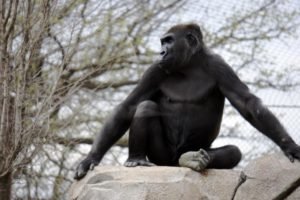By TESHA M. CHRISTENSEN
Help polar bears this winter by turning down your thermostat two degrees.
“That amount of change in temp may seem small to us, but it has a positive impact over time,” observed Como Park Zoo & Conservatory Events Coordinator Lindsay Sypnieski.
In fact, if every American adjusted the thermostat up or down by one degree each season, it would save as much energy as the state of Iowa uses in a year.
Taking action now won’t result in an immediate stop to climate change, but new studies show that people could see the effects in about a decade, according to the Polar Bears International, an organization that Como partners with that is focused on how climate change is affecting polar bears in the wild.
Ways that people can help endangered animals is the focus of a new program at Como Park Zoo.
S.A.F.E. Sundays at Como
While Como has been a part of the Association of Zoos and Aquariums’ Saving Animals From Extinction (S.A.F.E.) program since 2015, it began S.A.F.E. Sundays last November.
The purpose of the new initiative is “to communicate Como Park Zoo and Conservatory’s effort as part of this program and engage our visitors in conversations about the animals here at Como, how we help them in the wild, and what the visitor can do to help save these animals from extinction,” explained Sypnieski.
Polar Bears will be the focus on Jan. 14, and orangutans, tigers, spider monkeys, and langurs have been discussed since the program began.
Palm oil affects orangutans
In early December, the S.A.F.E. Sundays program focused on palm oil and orangutans.
Orangutans (photo right courtesy of Como Zoo and Conservatory) are being affected by the palm oil crisis due to deforestation, habitat degradation, climate change, animal cruelty and indigenous rights abuses in the countries (primarily Borneo and Sumatra) where palm oil is harvested. A century ago there were more than 230,000 orangutans in total, but the Bornean orangutan is now estimated at 104,700 based on updated geographic range (Endangered) and the Sumatran about 7,500 (Critically Endangered).
Here in Minnesota, people can help the orangutans by “making conscious choices with our buying habits and making sure that companies we purchase items from are part of the Roundtable on Sustainable Palm Oil,” observed Sypnieski.
The Roundtable on Sustainable Palm Oil (RSPO) is working to transform the market to make sustainable palm oil the norm. The North American Sustainable Palm Oil Network (NASPON) was just established on Dec. 19. Founding members of NASPON include Ahold Delhaize, Albertsons Companies, Barry Callebaut, Blommer Chocolate Company, Conservation International, Control Union, Dunkin’ Brands, Fuji Oils, International Flavors & Fragrances, IOI Loders Croklaan, Kellogg Company, Kraft Heinz, PepsiCo, Rainforest Alliance, and Target.
Cell phones affect gorillas
Recycle your cell phone, save the gorillas.
It may not be as simple as that, but a recycling program to collect old cell phones at the Como Zoo and other American zoos is highlighting the little-known connection between cell phone use and the survival of African gorillas.
 SONY DSC[/caption]
SONY DSC[/caption] Coltan, a mineral that is used in making cell phones, is extracted in the deep forests of Congo in central Africa, home to the world’s endangered lowland gorillas (photo left courtesy of Como Zoo and Conservatory).
Columbite-tantalite (coltan for short) is a metallic ore that, when refined, becomes metallic tantalum, a heat-resistant powder that can hold a high electrical charge. These properties are ideal for making capacitors, which are used in many electronic devices, including cell phones.
Conflict, illegal mining, and the growing bush-meat trade (the hunting of wild animals for food) have all contributed to a 70 percent population decline of the eastern lowland gorilla, according to some estimates.
Como partners with Eco-Cell, a cell phone-recycling firm based in Louisville, KY, and receives funds for each phone donated. The newer smartphones, such as the Apple iPhone and Samsung Galaxy, can usually be reused and are worth money back. Many old cell phones cannot be reused and must be recycled. Eco-Cell recycles these types of devices properly and uses best practices regarding smelting, diversion of toxins and reclamation of precious metals.
Drop off unwanted cell phones in the collection boxes located in the Como Visitor Center and Primate Building. Collections from recycling drives can also be mailed directly to Eco-cell; contact ComoEducation@ci.stpaul.mn.us to receive shipping labels.
Upcoming programs
Plan to attend upcoming S.A.F.E. Sundays at Como. Learn about penguins on Jan. 21, lemurs on Jan. 28, gorillas on Feb. 4 and snow leopards on Feb. 11. Each program runs from 1-3pm, and you can find a full schedule online. Look for the S.A.F.E. Sundays table at the featured animal’s exhibit.
Comments
No comments on this item Please log in to comment by clicking here